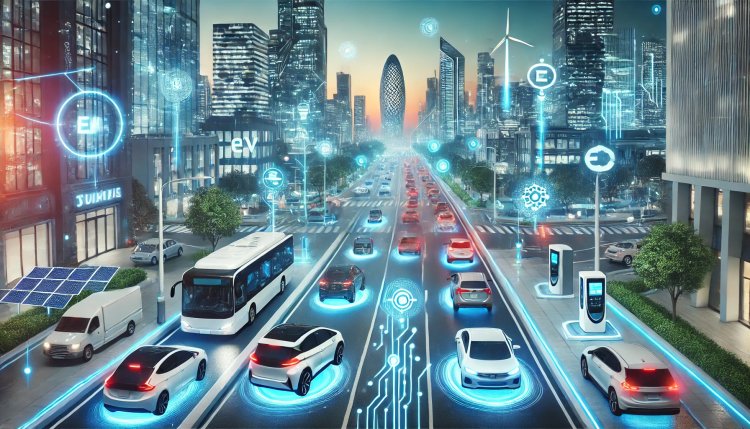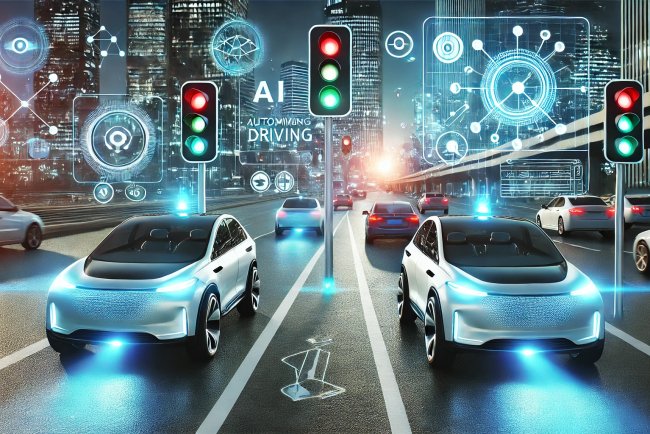The Future of Electric Vehicles: How EVs Are Revolutionizing Transportation

Introduction
The world is shifting towards a greener, more sustainable future, and electric vehicles (EVs) are at the center of this transformation. With major advancements in battery technology, charging infrastructure, and government policies, EVs are quickly becoming the preferred choice over traditional gasoline-powered cars.
But what does the future hold for electric vehicles? Will they completely replace fossil-fuel cars, or are there challenges that still need to be addressed? In this blog, we’ll explore how EVs are revolutionizing transportation and shaping a cleaner, more efficient world.
The Rise of Electric Vehicles
In recent years, EV adoption has surged due to:
✅ Advancements in battery technology (Longer range & faster charging)
✅ Government incentives (Tax credits, subsidies, and bans on gas cars)
✅ Increased environmental awareness (Lower carbon footprint & air pollution)
✅ Improved EV infrastructure (More charging stations worldwide)
???? Global EV Sales Boom:
- In 2023, over 10 million electric cars were sold worldwide.
- EVs are projected to make up 60% of all new car sales by 2035.
- Tesla, Rivian, Lucid, BYD, and traditional automakers (like Ford & GM) are heavily investing in EV production.
How EVs Are Revolutionizing Transportation
1. Cutting Down Carbon Emissions ????
One of the biggest reasons for EV adoption is their positive impact on the environment.
???? Gasoline cars emit tons of CO₂ every year, contributing to global warming.
???? EVs produce zero tailpipe emissions, reducing air pollution in cities.
???? Many countries are shifting towards renewable energy (solar & wind) to power EVs, making them even cleaner.
???? Example: Norway plans to ban the sale of new gasoline cars by 2025, leading the global EV transition.
2. Advanced Battery Technology ????
One of the biggest challenges for EVs has been battery life and charging time, but technology is improving rapidly.
✅ Solid-State Batteries: Offer higher energy density, longer range, and faster charging than lithium-ion batteries.
✅ Faster Charging: Companies like Tesla and Porsche are developing rapid charging stations that charge an EV in under 15 minutes.
✅ Battery Recycling: Tesla & Redwood Materials are working on recycling used batteries to make EVs more sustainable.
???? Upcoming EV Models with Long Ranges:
- Tesla Roadster (620 miles range)
- Lucid Air (516 miles range)
- Mercedes EQS (450 miles range)
3. Growth of Charging Infrastructure ⚡
EV adoption depends on convenient charging stations. Thankfully, the world is rapidly expanding its EV infrastructure.
???? Superchargers & Fast Chargers: Tesla, ChargePoint, and Electrify America are installing high-speed chargers worldwide.
???? Wireless Charging Technology: Future EVs may use inductive charging pads that charge without cables.
???? Solar-Powered Charging Stations: Green energy solutions are making EVs even more eco-friendly.
???? China leads the EV revolution, with over 1.8 million charging stations already installed!
4. Lower Maintenance & Cost Savings ????
EVs have fewer moving parts than traditional gas cars, meaning lower maintenance costs.
✅ No oil changes or engine repairs
✅ Regenerative braking extends brake life
✅ Electricity is cheaper than gasoline, reducing fuel costs
???? Studies show that EV owners save an average of $600–$1,000 per year on maintenance and fuel!
5. The Future of Autonomous Electric Vehicles ????????
EVs are also playing a major role in self-driving technology. AI-powered autonomous electric vehicles (AEVs) will reshape ride-sharing, delivery services, and city transportation.
???? Tesla’s Full Self-Driving (FSD) – Advancing towards full automation.
???? Robotaxis – Companies like Waymo, Cruise, and Tesla are developing self-driving taxis.
???? Smart Traffic Management – AI-powered EVs will reduce traffic congestion & accidents.
???? Experts predict that self-driving EVs will dominate ride-sharing platforms like Uber & Lyft within the next decade!
Challenges That Still Need to Be Solved
Despite rapid progress, EVs still face hurdles:
1. High Initial Cost ????
❌ Many EVs are expensive upfront, although prices are dropping with new battery technology.
???? Solution: More affordable EV models (like the Tesla Model 2 and BYD Dolphin) are launching soon.
2. Charging Time & Availability ⚡
❌ Long charging times can be inconvenient, especially for long trips.
???? Solution: Fast-charging stations & wireless charging pads will help improve convenience.
3. Limited Raw Materials for Batteries ????
❌ Lithium and cobalt mining for batteries has environmental and ethical concerns.
???? Solution: Companies are developing solid-state & sodium-ion batteries to reduce reliance on rare materials.
What’s Next for EVs?
???? Exciting EV innovations coming soon:
✅ Flying electric cars & urban air mobility (E-VTOLs)
✅ Solar-powered electric vehicles (like Aptera’s solar EV)
✅ Long-range EVs exceeding 800 miles per charge
✅ Widespread wireless EV charging roads
???? By 2040, experts predict that nearly 100% of new cars sold worldwide will be electric!
Conclusion: The Road Ahead for EVs
The future of transportation is electric, sustainable, and smarter than ever. With advanced battery tech, improved infrastructure, and affordable models, EVs are set to completely replace gasoline-powered cars within the next few decades.
???? Electric vehicles aren’t just the future—they’re the present. Are you ready for the EV revolution? ????⚡
What's Your Reaction?














